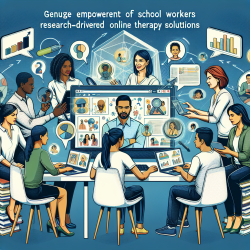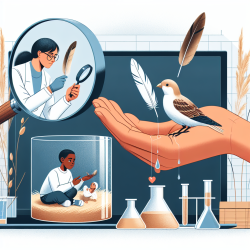Improving Skills through Peer-Learning Reviews: Insights from Gauteng's Community-Oriented Primary Care
In the realm of community healthcare, the importance of structured learning and quality improvement cannot be overstated. A recent study titled Peer-learning reviews to improve Gauteng community-oriented primary care: Findings from AitaHealth™-enabled ward-based outreach teams sheds light on how peer-learning reviews (PLRs) can be instrumental in enhancing the skills and outcomes of healthcare practitioners. For professionals in speech-language pathology, particularly those engaged in online therapy services like TinyEYE, the findings from this study offer valuable insights that can be applied to improve service delivery and outcomes for children.
Key Findings from the Study
The study, conducted in two districts of Gauteng province, South Africa, assessed the implementation fidelity and quality of community-based healthcare services through a 3-day PLR process. The results were promising, indicating that PLRs supported inclusive, context-specific learning and generated action plans derived from shared understanding and joint decision-making.
Key Achievements and Challenges Identified:
- Mapping: Effective use of mapping to identify community practice areas and allocate community health workers (CHWs) to households, despite challenges like non-sequential and outdated municipal maps.
- Support and Partnerships: Establishing strong relationships with local authorities, healthcare providers, and social development partners, though challenges in organizational and relationship dynamics were noted.
- Infrastructure and Equipment: Limited meeting and learning spaces and a lack of essential equipment, highlighting the need for better resource allocation.
- Workplace Learning: Routine learning sessions that improved confidence and skills among CHWs, though more training and better communication were identified as areas for improvement.
Implications for Speech-Language Pathology
For practitioners in speech-language pathology, particularly those providing online therapy services, the study's findings underscore the importance of continuous learning and quality improvement. Here are some actionable insights:
- Embrace Peer-Learning: Incorporate regular peer-learning reviews into your practice to foster a culture of continuous improvement and shared knowledge.
- Focus on Relationships: Build strong partnerships with local schools, healthcare providers, and families to ensure comprehensive and integrated care for children.
- Leverage Technology: Utilize technology to facilitate learning and service delivery, much like the AitaHealth™ platform used in the study.
- Address Resource Gaps: Advocate for better resource allocation to ensure you have the necessary tools and spaces for effective therapy sessions.
Encouraging Further Research
The study also highlights the need for further research to explore the long-term impact of PLRs on service delivery and outcomes. As practitioners, staying informed about the latest research and being open to new methodologies can significantly enhance your practice and the outcomes for the children you serve.
To read the original research paper, please follow this link: Peer-learning reviews to improve Gauteng community-oriented primary care: Findings from AitaHealth™-enabled ward-based outreach teams.
In conclusion, the insights from this study provide a valuable framework for improving skills and outcomes in community-oriented primary care. By embracing peer-learning, building strong partnerships, leveraging technology, and addressing resource gaps, speech-language pathologists can create better outcomes for children and contribute to the overall improvement of community healthcare services.










